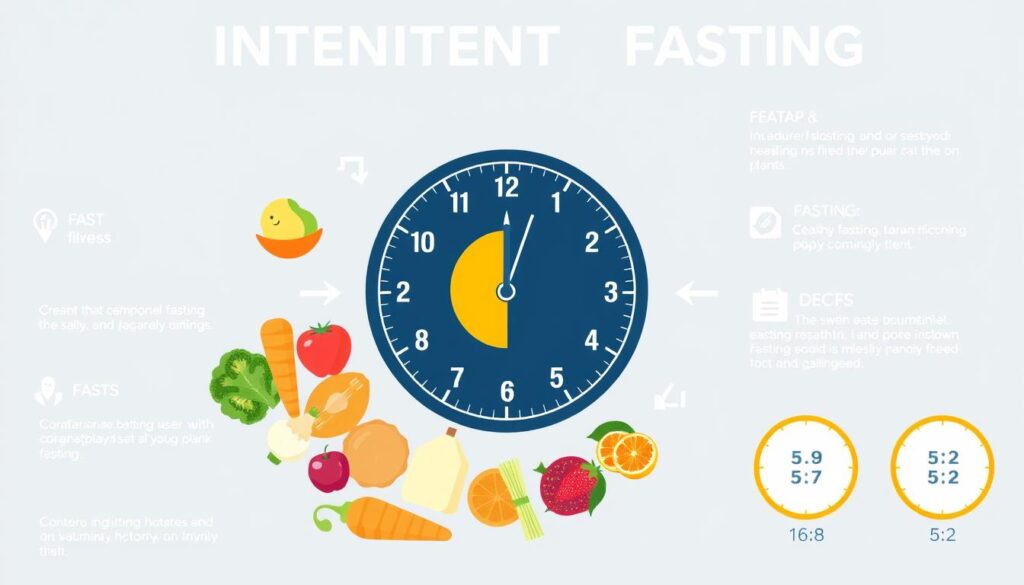“The greatest wealth is health.” ― Virgil. This timeless quote highlights the importance of our journey to better health. Especially through practices like intermittent fasting (IF).
Intermittent fasting has become more popular for weight management and healthy eating. It involves cycling between fasting and eating periods. This makes it simple and flexible for many. Johns Hopkins neuroscientist Mark Mattson has studied it for 25 years, finding both benefits and challenges1.
Everyone’s body reacts differently to intermittent fasting. It usually takes two to four weeks for the body to adjust to this new pattern1. Success in intermittent fasting comes from combining it with nutrition awareness. This leads to balanced eating habits and sustainable weight management.
Key Takeaways
- Intermittent fasting alternates between fasting and eating intervals.
- Johns Hopkins neuroscientist Mark Mattson has researched intermittent fasting for 25 years1.
- The body typically takes two to four weeks to adapt to intermittent fasting1.
- Combining intermittent fasting with nutrition awareness promotes balanced, healthy eating habits.
- Intermittent fasting is an effective strategy for weight management and improving overall health.
What is Intermittent Fasting?
Intermittent fasting is a way of eating that alternates between fasting and eating. It’s not about what you eat, but when. This pattern helps many manage their weight and health. It also makes meal planning simpler and boosts well-being.
Definition and Overview
Intermittent fasting has different methods like the 16/8, Eat-Stop-Eat, and 5:2 diets. Alternate-day fasting means eating normally one day and fasting the next. The 5:2 diet involves eating normally for five days and fasting for two2.
Daily time-restricted fasting means eating in an eight-hour window each day2. Research shows it can lead to weight loss, less inflammation, and better health2.
Historical Context
In the past, humans often fasted due to food scarcity. This natural pattern is seen in many cultures and religions. It shows how fasting has been a part of human life for centuries3.
Types of Intermittent Fasting
The main types are the 16/8, Eat-Stop-Eat, and 5:2 diets. The 16/8 method has an eight-hour eating window and 16 hours of fasting. Eat-Stop-Eat involves fasting for 24 hours once or twice a week.
The 5:2 diet means eating normally for five days and eating 500-600 calories on two non-consecutive days. Each method offers benefits and suits different lifestyles, helping people manage their eating.
Common Methods of Intermittent Fasting
Intermittent fasting is getting more popular for its health benefits. It’s key to know the main fasting methods and their benefits. I’ll cover the 16/8 Method, Eat-Stop-Eat Method, and the 5:2 Diet, which are well-known.
16/8 Method
The 16/8 method means fasting for 16 hours a day and eating in an 8-hour window. You skip breakfast and eat from noon to 8 PM. It’s easy to follow and helps with weight loss45.
Eat-Stop-Eat Method
The Eat-Stop-Eat method involves fasting for 24 hours, once or twice a week. It requires planning and can be tough. But, it’s good for calorie control and health benefits45. Some might feel tired, have headaches, or feel irritable.
5:2 Diet
The 5:2 Diet lets you eat normally five days a week. You eat 500-600 calories on the other two days. It’s great for those who don’t want to fast every day but still want to lose weight45.
| Method | Fasting Duration | Eating Window/Allowance |
|---|---|---|
| 16/8 Method | 16 hours | 8 hours |
| Eat-Stop-Eat Method | 24 hours | N/A |
| 5:2 Diet | 2 non-consecutive days per week | 500-600 calories on fasting days |
Health Benefits of Intermittent Fasting
Intermittent fasting has many health benefits, backed by research. It’s great for weight loss, improving metabolic health, brain function, and heart health. These benefits are key for those thinking about trying it.
Weight Loss
One big reason people try intermittent fasting is for weight loss. It helps create a caloric deficit and balances hormones. Studies show it can lead to a 9% weight loss in 12 weeks6.
A review of 27 studies found weight loss ranging from 0.8% to 13%6. This shows it’s effective for managing weight.
Improved Metabolic Health
Intermittent fasting boosts metabolic health by improving insulin sensitivity and lowering insulin levels. It can lower fasting blood sugar by 0.15 millimoles per liter6. This reduces the risk of type 2 diabetes.
But, results differ by gender. Men see better blood sugar control, while women may see it worsen after three weeks6.
Enhanced Brain Function
Fasting can also improve brain health. It boosts brain hormone levels and may promote neuronal growth. Research suggests it could help prevent or lessen Alzheimer’s disease6.
This effect is due to better energy metabolism and less oxidative stress.
Heart Health Benefits
Lastly, intermittent fasting is good for the heart. It reduces inflammation, helping with conditions like arthritis and asthma7. It also lowers blood pressure and cholesterol, improving heart health.
This overall improvement supports long-term wellness and heart health.
Intermittent Fasting and Nutrition Awareness
Integrating intermittent fasting with balanced nutrition is key for good health. Eating nutrient-rich foods during non-fasting times is important. Celebrities like Jimmy Kimmel and Jennifer Aniston have shown its benefits for weight loss. But, it’s important to eat mindfully to get the most benefits8.
Every January, health and weight-loss questions surge, showing the trend’s importance8. A diet rich in nutrients is crucial, especially with fasting methods like 16:8 or 5:2. These methods are popular, with millions searching for them online9.
Eating healthy foods during your eating times is vital. Focus on leafy greens, healthy fats, proteins, and complex carbs. This approach is better than just cutting calories. It’s similar to the Mediterranean diet, which supports long-term fasting8.
Research on intermittent fasting shows mixed results. Some studies find it improves insulin sensitivity, blood pressure, and sleep8. But, more research is needed to confirm these benefits. Always talk to a healthcare professional to tailor a diet that fits your needs9.
Sticking to intermittent fasting long-term can be tough. The 5:2 diet is harder than the 16:8 method for many8. Healthy eating habits and meal planning help. They ensure you get the nutrients you need and support weight management.
Intermittent fasting isn’t for everyone. It’s not good for those under 18, people with eating disorders, pregnant or breastfeeding women, or those needing food with medication8. Always get professional advice to make sure it’s safe for you9.
How Intermittent Fasting Affects Cells and Hormones
Intermittent fasting changes how our cells work and our hormones balance. This affects our health in many ways. Let’s explore these changes.
Human Growth Hormone (HGH)
When we fast, our Human Growth Hormone (HGH) levels go up a lot. They can increase by up to five times. This hormone helps us lose fat and build muscle, making fasting good for our body shape10.
This balance also boosts our energy and strength. It’s key for staying active.
Insulin Sensitivity
Intermittent fasting makes our bodies better at using insulin. This means we burn fat more easily, helping with weight and metabolic health10. It’s especially important because about 35% of adults in the U.S. have prediabetes. Without action, 15–30% could get type 2 diabetes in five years10.
Gene Expression and Cellular Repair
Intermittent fasting also changes our genes for the better. It makes genes that help us live longer and fight diseases more active. One key process is autophagy, which cleans out damaged cells. This keeps our cells working well and lowers the risk of age-related problems10.
Intermittent fasting offers many health benefits. It improves insulin sensitivity, hormone balance, and cell function. By trying these fasting methods, we can greatly enhance our metabolic and cellular health.
Getting Started with Intermittent Fasting
Starting intermittent fasting means picking a method that fits your life and goals. Knowing the different methods and easing into fasting can make it easier.
Choosing the Right Method for You
Choosing the right method for intermittent fasting is key. The 16/8 method, or Leangains protocol, has an 8-hour eating window and 16-hour fast. It’s a favorite among many1112. If you want something less strict, try the 5:2 plan. It has five days of normal eating and two days of eating less (500-600 calories)12. Think about your daily life and health goals to pick the best method.
Gradual Adaptation and Tips
It’s important to start slow with intermittent fasting. Begin with the 16/8 method to get used to it without shocking your body11. Drinking water, coffee, or tea during fasting is okay because they have no calories11. Paying attention to your body and adjusting as needed is crucial during this time.
Monitoring Progress and Adjusting
Tracking your progress is key to adjusting your fasting plan. Intermittent fasting can lead to weight loss of 0.8% to 13% in people who are overweight11. Keep a record of your weight, energy, and any changes. This helps you see patterns and make changes to keep your fasting plan working for you. Always talk to a healthcare professional for advice to ensure safety and get the most out of intermittent fasting1113.
Potential Risks and Considerations
Intermittent fasting can be good for health, but it has risks. Many people feel hungry, mood swings, and brain fog at first14. These side effects usually go away, but they can mess up your day-to-day life.
Not everyone can try intermittent fasting. People with diabetes, heart disease, or kidney issues need to be careful15. Pregnant or breastfeeding women, those with low blood pressure, and people on certain meds should also be cautious.
Younger and female folks might face special challenges with intermittent fasting16. It can affect their menstrual cycles and hormone levels. Also, people with eating disorders like anorexia or bulimia should stay away from it16.
When starting intermittent fasting, it’s key to be safe. Getting advice from a doctor is a good idea. They can make sure it’s right for you. If you’re also on a strict diet, watch out for binge eating and cravings16.
In short, intermittent fasting has its benefits, but it’s not for everyone. Knowing the risks and taking the right precautions is important. This way, you can enjoy the benefits safely.
Intermittent Fasting for Beginners: Practical Guidance
Starting intermittent fasting can feel overwhelming, but with some guidance, it gets easier. It’s key to focus on meal prep and balancing macronutrients. Planning and preparing meals helps you stick to your fasting schedule, making it a smoother transition.
Meal Planning and Preparation
Good meal planning is vital for intermittent fasting success. Preparing meals in advance means you have healthy food ready when you can eat. This helps avoid unhealthy snacks and keeps you on track with your fasting goals.
Balancing Macronutrients
Knowing how to balance proteins, fats, and carbs is important. Eating meals high in protein and healthy fats can make you feel full longer17. Also, a diet rich in fiber keeps energy steady and supports digestion. Balanced meals help you stick to this eating pattern and enjoy its health benefits, like better blood sugar and cholesterol levels18.
Timing and Consistency
Being consistent is crucial for beginners. Regular eating and fasting times help your body adjust quickly. For example, fasting for 16-20 hours daily, with a 4-8 hour eating window, is common17. Sticking to a routine boosts metabolic benefits and helps reach health goals faster. A consistent schedule makes meal prep easier and helps with social life and meeting your body’s needs.
FAQ
What is intermittent fasting?
How does intermittent fasting benefit weight management?
What are common methods of intermittent fasting?
How should I start intermittent fasting as a beginner?
What are the health benefits of intermittent fasting?
How does intermittent fasting affect cells and hormones?
Are there any risks associated with intermittent fasting?
How can nutrition awareness optimize intermittent fasting benefits?
What practical tips can help maintain a consistent intermittent fasting routine?
Can intermittent fasting affect hormones?
Source Links
- https://www.hopkinsmedicine.org/health/wellness-and-prevention/intermittent-fasting-what-is-it-and-how-does-it-work
- https://www.mayoclinic.org/healthy-lifestyle/nutrition-and-healthy-eating/expert-answers/intermittent-fasting/faq-20441303
- https://www.ncbi.nlm.nih.gov/pmc/articles/PMC9998115/
- https://www.healthline.com/nutrition/6-ways-to-do-intermittent-fasting
- https://health.clevelandclinic.org/intermittent-fasting-4-different-types-explained
- https://www.healthline.com/nutrition/10-health-benefits-of-intermittent-fasting
- https://www.uclahealth.org/news/article/health-benefits-of-intermittent-fasting-and-tips-for-making-it-work
- https://www.medstarhealth.org/blog/intermittent-fasting-faq
- https://www.eatright.org/health/wellness/diet-trends/what-is-intermittent-fasting
- https://pmc.ncbi.nlm.nih.gov/articles/PMC8839325/
- https://www.healthline.com/nutrition/intermittent-fasting-guide
- https://sph.umich.edu/pursuit/2019posts/beginners-guide-to-intermittent-fasting.html
- https://www.webmd.com/diet/a-z/intermittent-fasting
- https://ovyvo.com/is-intermittent-fasting-right-for-you-pros-cons-and-everything-you-need-to-know/
- https://www.massgeneralbrigham.org/en/about/newsroom/articles/pros-and-cons-of-intermittent-fasting
- https://www.ncbi.nlm.nih.gov/pmc/articles/PMC10589984/
- https://yokota.tricare.mil/Health-Services/Preventive-Care/PRO-Health/Performance-Nutrition/Intermittent-Fasting-Is-it-Right-for-You/
- https://www.ncbi.nlm.nih.gov/pmc/articles/PMC8151159/






